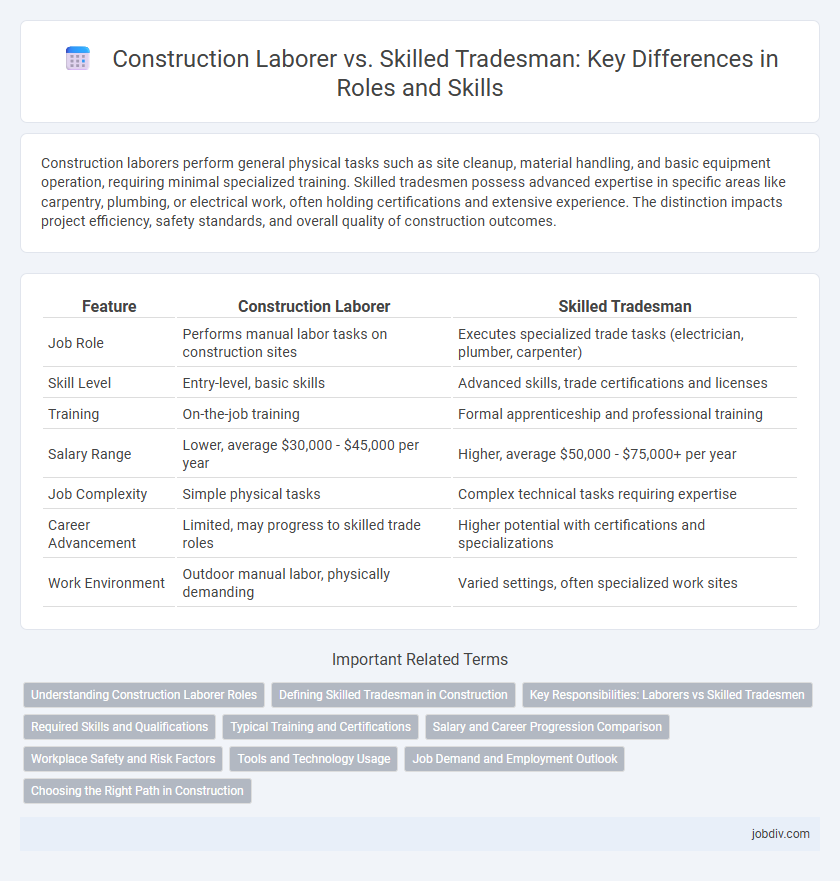Construction laborers perform general physical tasks such as site cleanup, material handling, and basic equipment operation, requiring minimal specialized training. Skilled tradesmen possess advanced expertise in specific areas like carpentry, plumbing, or electrical work, often holding certifications and extensive experience. The distinction impacts project efficiency, safety standards, and overall quality of construction outcomes.
Table of Comparison
| Feature | Construction Laborer | Skilled Tradesman |
|---|---|---|
| Job Role | Performs manual labor tasks on construction sites | Executes specialized trade tasks (electrician, plumber, carpenter) |
| Skill Level | Entry-level, basic skills | Advanced skills, trade certifications and licenses |
| Training | On-the-job training | Formal apprenticeship and professional training |
| Salary Range | Lower, average $30,000 - $45,000 per year | Higher, average $50,000 - $75,000+ per year |
| Job Complexity | Simple physical tasks | Complex technical tasks requiring expertise |
| Career Advancement | Limited, may progress to skilled trade roles | Higher potential with certifications and specializations |
| Work Environment | Outdoor manual labor, physically demanding | Varied settings, often specialized work sites |
Understanding Construction Laborer Roles
Construction laborers perform essential physical tasks such as site preparation, material handling, and equipment operation to support overall project progress. Skilled tradesmen possess specialized expertise in areas like carpentry, plumbing, or electrical work, enabling them to complete complex installations and repairs. Recognizing the distinct roles of construction laborers versus skilled tradesmen improves workforce allocation and project efficiency on job sites.
Defining Skilled Tradesman in Construction
A skilled tradesman in construction possesses specialized training and expertise in particular crafts such as carpentry, plumbing, or electrical work, allowing them to perform complex tasks with precision. Unlike general construction laborers, skilled tradesmen often undergo apprenticeships or certification programs to master technical skills and ensure adherence to building codes and safety standards. Their proficiency directly impacts project quality, efficiency, and compliance in construction projects.
Key Responsibilities: Laborers vs Skilled Tradesmen
Construction laborers perform essential tasks such as site preparation, material handling, debris removal, and assisting skilled tradesmen, contributing to overall project efficiency. Skilled tradesmen specialize in specific areas like carpentry, plumbing, electrical work, and masonry, applying technical expertise to execute complex construction elements with precision. The distinct key responsibilities underscore the laborer's support role versus the skilled tradesman's focus on specialized, hands-on craftsmanship crucial to project success.
Required Skills and Qualifications
Construction laborers typically require basic skills such as physical strength, stamina, and the ability to follow instructions, with minimal formal training or certifications. Skilled tradesmen possess specialized abilities in areas like carpentry, electrical work, or plumbing, often requiring apprenticeships, technical education, and industry certifications. The distinction in qualifications significantly impacts job responsibilities, wage levels, and career advancement opportunities within the construction industry.
Typical Training and Certifications
Construction laborers typically receive on-the-job training and may complete basic safety courses such as OSHA 10- or 30-hour certifications to meet project requirements. Skilled tradesmen undergo formal apprenticeships, often lasting 3 to 5 years, combining classroom instruction with hands-on experience, and earn certifications or licenses relevant to their trade, such as electrical journeyman licenses or plumbing certificates. These credentials ensure proficiency, compliance with industry standards, and qualification for specialized construction tasks.
Salary and Career Progression Comparison
Construction laborers earn an average hourly wage of $17 to $22, while skilled tradesmen such as electricians, plumbers, and carpenters typically command salaries ranging from $25 to $40 per hour due to specialized expertise. Career progression for laborers often involves gaining experience and potentially moving into supervisory roles, whereas skilled tradesmen have opportunities for advanced certifications, apprenticeships, and specialization that lead to higher earning potential and project leadership positions. Demand for skilled trades remains strong, with industry reports projecting continued salary growth driven by infrastructure development and skilled labor shortages.
Workplace Safety and Risk Factors
Construction laborers face higher risks related to physical strain and exposure to hazardous materials, necessitating strict adherence to safety protocols and personal protective equipment (PPE). Skilled tradesmen, while benefiting from specialized training, encounter complex risks such as operating heavy machinery and working at heights, requiring advanced safety measures and continuous hazard assessment. Both roles demand rigorous safety training to minimize accidents, with OSHA regulations playing a critical role in establishing standards that protect workers on-site.
Tools and Technology Usage
Construction laborers typically use basic hand tools such as hammers, shovels, and wheelbarrows, relying on manual skills for general site preparation and material handling. Skilled tradesmen operate advanced tools and technology including power saws, laser levels, and specialized diagnostic equipment to perform precise tasks in areas like carpentry, plumbing, and electrical work. The increasing integration of digital tools such as Building Information Modeling (BIM) and automated machinery further enhances the efficiency and accuracy of skilled tradesmen compared to laborers.
Job Demand and Employment Outlook
Construction laborers face steady demand due to their versatile role in various building projects, especially in infrastructure and residential construction. Skilled tradesmen, such as electricians, plumbers, and masons, experience higher employment growth driven by specialized expertise required for complex tasks and technological advancements. The Bureau of Labor Statistics projects above-average job growth for skilled trades, reflecting increased reliance on trained professionals in modernization and renovation projects.
Choosing the Right Path in Construction
Construction laborers perform general site tasks such as loading materials, clearing debris, and assisting skilled tradesmen, offering quick entry and versatile job opportunities. Skilled tradesmen specialize in specific crafts like carpentry, electrical work, or plumbing, requiring formal training, certifications, and higher wages due to their expertise. Choosing the right path depends on individual career goals, desired skill development, and long-term earning potential within the construction industry.
Construction Laborer vs Skilled Tradesman Infographic

 jobdiv.com
jobdiv.com